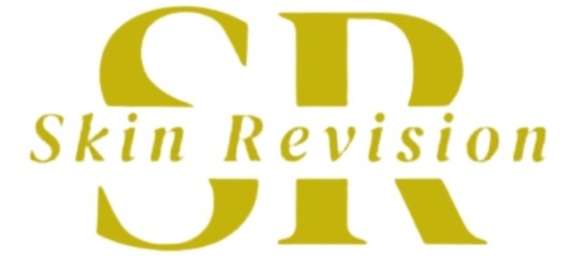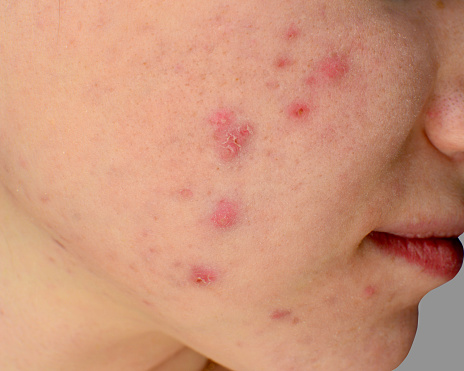Teenage Acne: Causes, Prevention, and Effective Treatments for Girls and Boys at Skin Revision
Teenage acne is a common skin concern that affects many adolescents, girls, boys and young adults during their formative years. It can impact self-esteem and confidence, making effective management and treatment essential. Acne during the teenage years is often linked to hormonal changes, but factors like diet, skincare habits, and genetics also play a role.
At Skin Revision, we specialise in treating teenage acne using advanced, non-invasive methods that target the root causes of breakouts. This article explores the causes of teenage acne in girls and boys, how to prevent it, and the effective treatments available to help teens achieve clear, healthy skin.
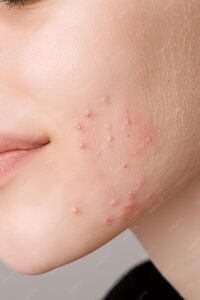
What Causes Teenage Acne?
Acne occurs when hair follicles become clogged with oil (sebum), dead skin cells, and bacteria. During adolescence, hormonal changes increase sebum production, leading to more frequent breakouts. Common causes include:
- Hormonal Changes
During puberty, hormonal fluctuations—particularly an increase in androgens—stimulate the sebaceous glands to produce more oil, which can clog pores and cause acne. - Genetics
A family history of acne can increase the likelihood of developing the condition during the teenage years. - Diet
Certain foods, particularly those high in sugar and dairy, may exacerbate acne in some individuals. - Poor Skincare Habits
Using products that clog pores, skipping cleansing, or over-washing can irritate the skin and worsen breakouts. - Stress
Stress triggers hormonal imbalances that can increase oil production, leading to more acne. - Environmental Factors
Pollution, sweat, and exposure to greasy environments can contribute to clogged pores and acne formation.
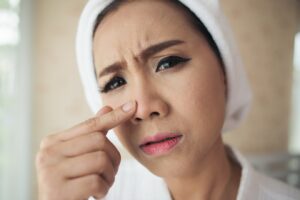
Types of Teenage Acne
Teenage acne can vary in severity and appearance. The most common types include:
- Blackheads: Open pores clogged with sebum and dead skin cells that oxidize and turn dark.
- Whiteheads: Closed pores clogged with oil and bacteria, appearing as small, white bumps.
- Papules: Inflamed red or pink bumps that can be tender to the touch.
- Pustules: Pimples with a white or yellow centre caused by pus build-up.
- Nodules and Cysts: Severe, deep, and often painful types of acne that can lead to scarring.
Tips for Preventing Teenage Acne
While some acne is inevitable during adolescence, adopting healthy habits can reduce the severity and frequency of breakouts:
- Cleanse Twice Daily
Use a gentle, non-comedogenic cleanser to remove dirt, oil, and sweat without irritating the skin. - Avoid Harsh Scrubbing
Over-exfoliation or harsh scrubbing can irritate the skin and worsen acne. - Moisturize
Even oily skin needs hydration. Use an oil-free, non-comedogenic moisturiser to maintain balance. - Use Acne-Friendly Products
Look for skincare products containing salicylic acid or benzoyl peroxide to target acne. - Don’t Pick or Squeeze Pimples
Picking at acne can lead to scarring and worsen inflammation. - Follow a Balanced Diet
Limit high-sugar and high-dairy foods that may contribute to breakouts. - Stay Hydrated
Drinking enough water supports skin health and can reduce the appearance of acne. - Protect Your Skin
Apply a broad-spectrum sunscreen daily to protect against UV damage, which can worsen post-acne marks.
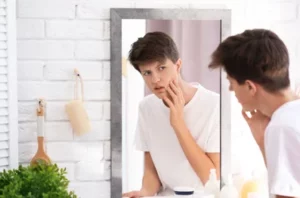
Professional Treatments for Teenage Acne at Skin Revision
When home remedies aren’t enough, professional treatments can provide faster and more effective results. At Skin Revision, we offer tailored solutions to address teenage acne and its effects:
1. DMK Enzyme Therapy
DMK Enzyme Therapy is a unique treatment that works with the skin’s natural processes to improve its health and function. It detoxifies the skin, reduces inflammation, and promotes oxygenation, making it ideal for managing acne.
- How It Works: The treatment uses enzymes to dissolve dead skin cells, unclog pores, and improve circulation.
- Benefits:
- Clears breakouts and reduces inflammation.
- Supports healing and prevents future acne.
- Improves overall skin texture and tone.
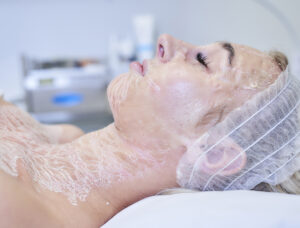
2. Chemical Peels
Chemical peels use exfoliating acids to remove the top layer of skin, unclogging pores and promoting cell turnover. Mild peels are particularly effective for teenage acne.
- How It Works: A gentle solution is applied to exfoliate the skin, removing dead cells, and reducing acne-causing bacteria.
- Benefits:
- Clears blackheads, whiteheads, and minor breakouts.
- Reduces redness and post-acne marks.
- Improves skin texture and tone.
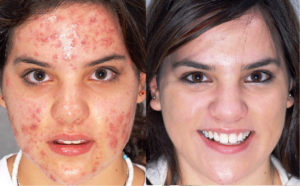
3. Jet Plasma
Jet Plasma is a non-invasive treatment that uses ionized gas to penetrate deep into the skin, targeting acne-causing bacteria and improving overall skin health.
- How It Works: Plasma energy promotes healing, reduces inflammation, and minimizes sebum production.
- Benefits:
- Reduces acne and prevents future breakouts.
- Improves skin texture and tone.
- Safe and effective for all skin types.
4. Dermalux Tri-Wave LED Light Therapy
Our cells absorb light and help make the body function. Different wavelengths of light stimulate different responses to the skin. Controlled levels of blue, red and nir infra-red light are clinically proven to be beneficial to the skin.
- How it works: LED phototherapy is the application of the necessary wavelengths that go into the skin’s deepest layers and that energise the skin cells to regenerate up to x20 faster. Each wavelength of light is absorbed by a different target that stimulates specific skin enhancing processes. The blemish fighting BLUE light targets bacteria in the sebaceous glands. These glands can cause spots, leading to acne and cystic acne, especially in young boys, girls and teenagers. When the bacteria absorbs this BLUE light, it triggers a natural photo chemical reaction which releases singlet oxygen. Singlet oxygen has a powerful anti-bacterial action to help eliminate spots, whilst being gentle on the skin.
- Benefits: Helping in the healing, repairing, smoothing, nourishing, hydrating and generating healthy skin.
5. Customised Skincare Plans
Our experts can create personalised acne skincare regimes that are tailored to your children, teenager or young adults skin type and acne severity. This may include recommending products with ingredients like retinoids, niacinamide, and azelaic acid to support treatment results.
Treating Acne Scars
For teenagers, young adults and adults with lingering acne scars, we offer solutions to reduce discoloration, improve skin texture and create smoother skin:
- DMK Enzyme Therapy: Encourages healing and collagen production.
- Mild Chemical Peels: Fades pigmentation and smooths uneven skin.
- Plaxel Plasma Pen: Addresses deeper scars by promoting collagen remodelling
- SQT: The unique and nature bio-microneedling process, fades acne scarring, blemishes and marks left by acne.
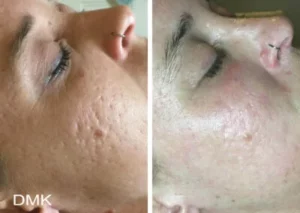
Why Choose Skin Revision for Teenage Acne?
At Skin Revision in Beaconsfield , we understand that teenage acne is more than just a skin concern—it can impact confidence and self-esteem. Our team is dedicated to providing compassionate, effective care tailored to each teen’s unique needs. With advanced treatments and personalised plans, we’ll help you or your teen achieve clearer, healthier skin.
Teenage acne can be challenging to manage, but with the right approach and professional care, clear skin is achievable. From DMK Enzyme Therapy and LED Light Therapy to Jet Plasma, Skin Revision offers effective treatments to target acne and improve skin health in boys, girls, teenagers and young adults.
Book a consultation with us and bring along with your children, or teenagers that are suffering with acne or cystic acne, and let us get them back to clearer, blemish-free, healthy skin.
Skin Revision is situated in Beaconsfield, close to High Wycombe, Gerrards Cross, Marlow and Slough.
